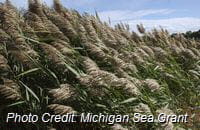Natural coastal wetlands have a profound, positive influence on the water quality in the Great Lakes region. Coastal wetlands are often sacrificed for commercial, recreational and residential development. Along with shoreline development, pollution, turbid storm runoff and the introduction of invasive species greatly diminish our freshwater heritage.
Wetlands slow storm runoff, filter pollutants, suppress waves that would erode the shoreline, and serve as food, shelter and incubator sources for many native fish, mammal, bird and insect species.
Of the numerous invasive species decimating our waters and wetlands in recent decades, phragmites (frag-MY-teze), a tall, virulent reed, is one of the most insidious.
Phragmites can spread by root or seed, expanding in concentrations so dense that it crowds out all other plants, while simultaneously reducing the nutrition, shelter and nursery functions of diverse, native wetland plants.
In a remarkable display of stewardship, a sportsmen’s organization, Ducks Unlimited, aided by federal, state and local partners, organized and implemented a project to control phragmites, including 1200 acres of wetlands in the Anchor Bay portion of Lake St. Clair.

No comments:
Post a Comment